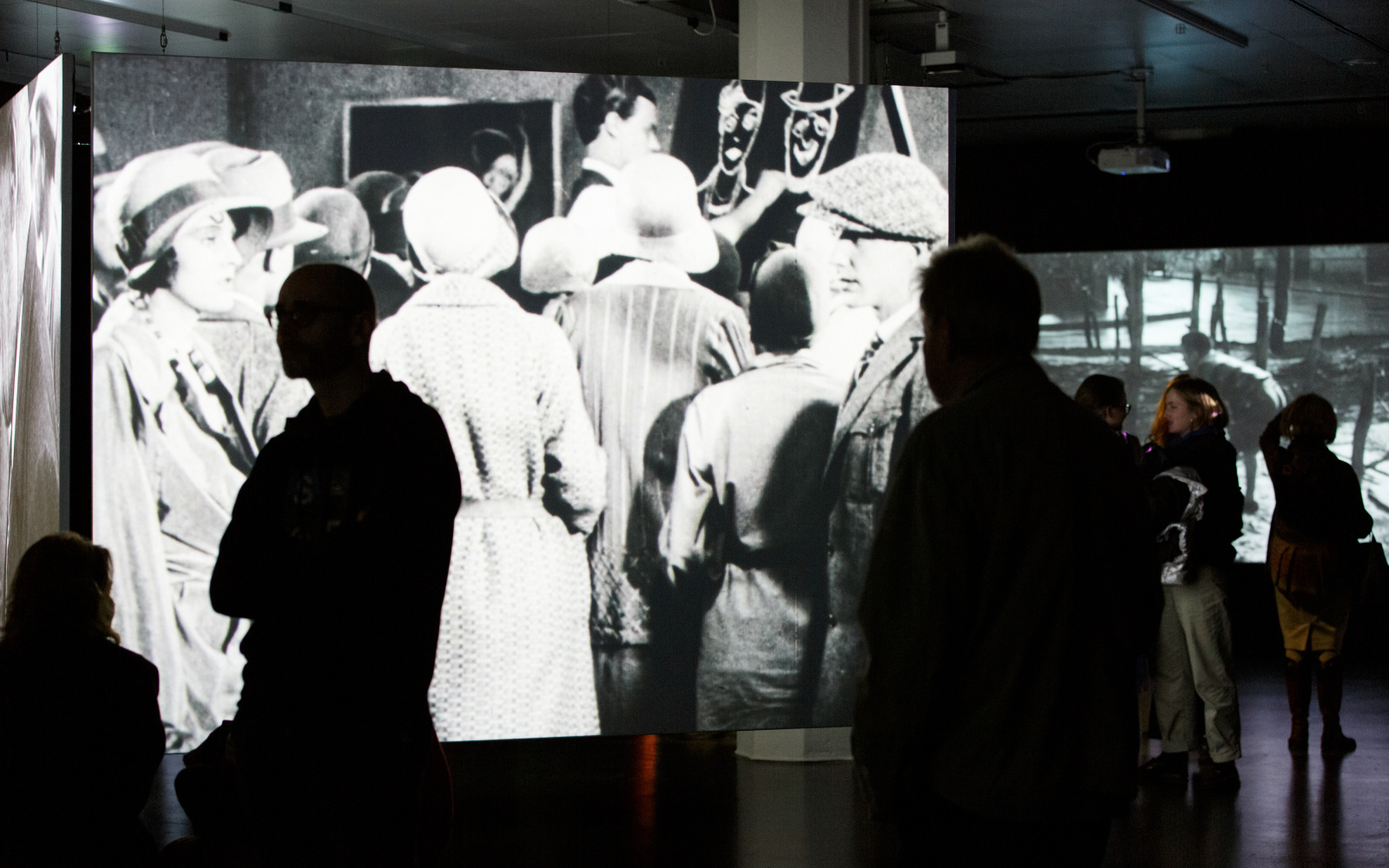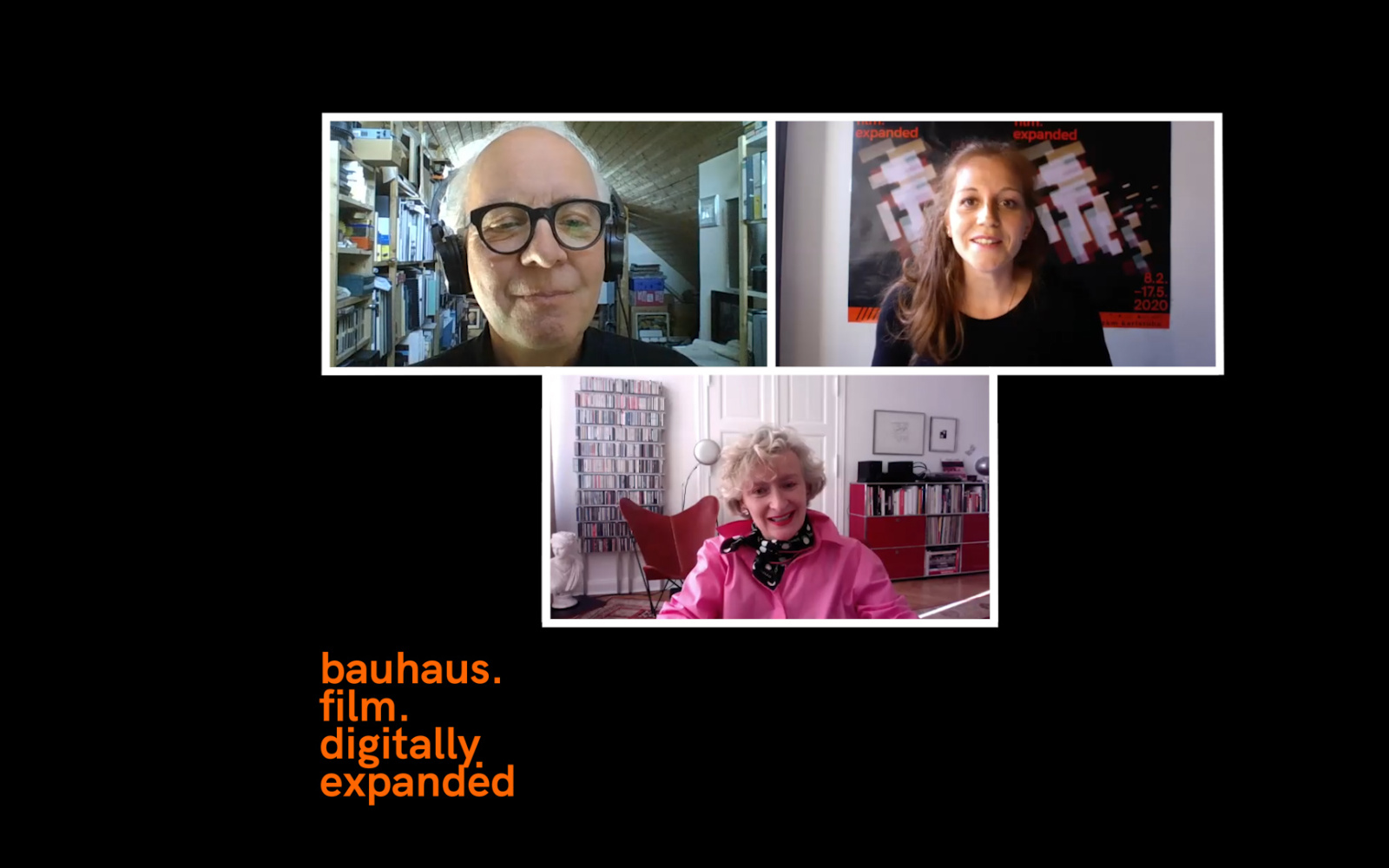Political and Experimental Film Essays
in the exhibition »bauhaus.film.expanded«
»The image should indicate what goes beyond its content. The divine ground, Meister Eckhart would say. The beauty of an ›ugly‹ face. The essence of things... I want the dignity and underlying hope to shine through the most unremarkable, ordinary, poor subjects.« (Ellen Auerbach, 1985)
Documentary films influenced by the »Neues Sehen« [New Vision] movement constitute a significant part of the Bauhaus films. The partly political, partly experimental film essays open up vistas of the vitality of the big city. Middle class avenues meet workers’ streets and industrial districts, and the camera’s eye focuses again and again on modernist architecture; everything is surrounded by the hustle and bustle of traffic, pedestrians, and playing children. The Bauhaus films also reveal a critical view of social discrepancies in the modern metropolis, but without looking at people from a voyeuristic or exploitative perspective. Street vendors, itinerant Roma and Sinti, or workers in dirty clothes are as much a part of the big city as the lives of the privileged and wealthy and all are documented objectively. In contrast to the advertising films of political parties, such as the SPD [Social Democratic Party] or KPD [Communist Party] during this period, the Bauhaus films did not visualize social inequality in modern societies. This observing camera of the Bauhaus is one of the most important achievements in the German documentary film of the Weimar Republic.
László Moholy-Nagy’s mainly short etudes or »social reportages« utilize the aesthetics of the »Absolute film« and transform the innovations of abstract cinema into a cinematic abstraction of real scenes. The films of Ellen Auerbach (née Rosenberg) and Ella Bergmann-Michel combine art and craftsmanship and introduce new, uncon- ventional perspectives on life.
Categorical rejection of nationalist, militarist, and authoritarian politics at the end of the Weimar Republic characterizes the political Bauhaus films. In Bergmann-Michel’s film »Wahlkampf« [Election Campaign] (1932), she documented how Nazi propaganda was penetrating the streets of Frankfurt in an increasingly militant manner. She was arrested in the middle of shooting the film and the Nazis confiscated some of the film footage and later destroyed them. Auerbach was born in Karlsruhe in 1906 to Orthodox Jewish parents. In »The Big Travel« (1933/1934) and »Tel Aviv« (1933/1934) she records her escape from Nazi Germany, and engages with the Jews living in exile in Palestine.
Films in the exhibition »bauhaus.film.expanded«
-
Political and Experimental Film Essays
Horacio Coppola, »Sueño« [Dream], FR 1933
16mm, b/w, silent, 02:15 by 25 frames/sec
DVD PAL filmed of a 16mm positiveHoracio Coppola, Grete Stern, Marc Chagall, Jean Miro, »Les Quais de la Seine« [Quays of the Seine], FR 1934
16mm, b/w, silent, 03:33 by 25 frames/sec
DVD PAL filmed of a 16mm PositiveHoracio Coppola, »A Sunday in Hampstead Heath«, GB 1935
16mm, b/w, silent, 08:51 by 25 frames/sec
DVD PAL fimed of a 16mm positiveLászló Moholy-Nagy, »Impressions of the Old Harbor of Marseilles (Vieux Port)«, FR 1929/1932
35mm, b/w, silent, 13:46 by 16 frames/sec
Digital copy of 35mm film: Light Cone
© Light Cone & the Moholy-Nagy FoundationHans Richter, Werner Graeff, »Everything turns, Everything revolves«, DE 1929
35mm, b/w, music: Walter Gronostay, 08:21 by 24 frames/sec
Digital copy of a 16mm positive
© Marion von HofackerEllen Auerbach, »A Cheerful Day in Rügen«, DE 1933
16mm, b/w, silent, 02:50 by 16 frames/sec
Digital copy of a 16mm positive
© VG-BILDEllen Auerbach, »Gretchen hat Ausgang«, 1933
16mm, b/w, silent, 06:35 by 16 frame/sec
Digital copy of a 16mm positive
© VG-BILDEllen Auerbach, »Bertold Brecht in exile in London«, GB 1936
16mm, b/w, silent, 00:57 by 16 frames/sec
Digital copy of a 16mm positive
© VG-BILDLászló Moholy-Nagy, »Berlin Still Life«, DE 1926
35mm, b/w, silent, 12:47 by 16 frames/sec
Digital copy of 35mm film: Light Cone
© Light Cone & the Moholy-Nagy FoundationLászló Moholy-Nagy, »Großstadt-Zigeuner« [Gypsies], DE 1932
35mm, b/w, silent, 18:04 by 16 frames/sec
Digital copy of 35mm film: Light Cone
© Light Cone & the Moholy-Nagy FoundationPeter Pewas, »Alexanderplatz Unawares«, 1932–1934
35mm, s/w, silent, 09:23 by 16 frames/sec
Digital copy of a 35mm Negative
© Stiftung Deutsche KinemathekEllen Auerbach, »The Big Travel«, DE 1933/1934
16mm, b/w, silent, 03:34 by 16 frame/sec
Digital copy of a 16mm positive
© VG-BILDEllen Auerbach, »Tel Aviv«, PS 1933/1934
16mm, b/w, silent, 10:35 by 16 frame/sec
Digital copy of a 16mm Positive
© VG-BILDElla Bergmann-Michel, »Election 1932 (Last Election)«, DE 1932/1933
35mm, b/w, silent, 09:09 by 16 frames/sec
Digital copy of a 35mm negative: DFF - Deutsches Filminstitut & Filmmuseum Frankfurt am Main
© Sünke MichelElla Bergmann-Michel, »Traveling Hawkers in Frankfurt am Main«, DE 1932
35mm / 16mm, b/w, silent, 21:15 by 16 frames/sec
Combinational digital copy of five 35mm negatives and a 16mm positive: DFF - Deutsches Filminstitut & Filmmuseum Frankfurt am Main
© Sünke Michel
bauhaus.film.digitally.expanded: Politische und Experimentelle Filmessays
Some films in this section were available online until August 23, 2020. The release was accompanied by a live discussion on April 23, 2020 at 6 pm between Jeannine Fiedler and Rolf Sachsse, moderated by Teresa Retzer.

